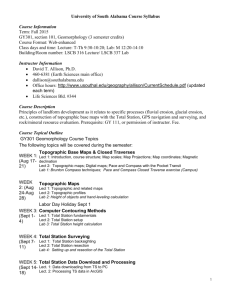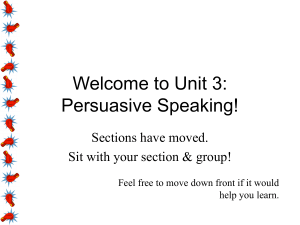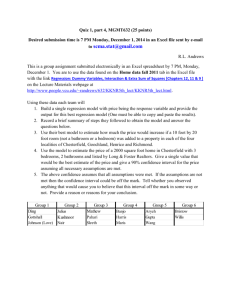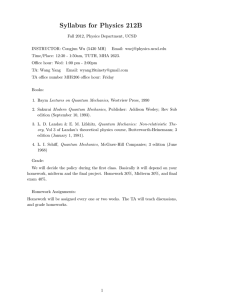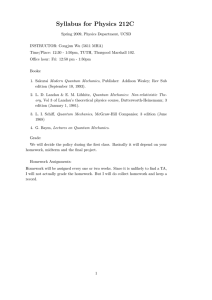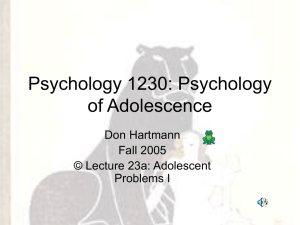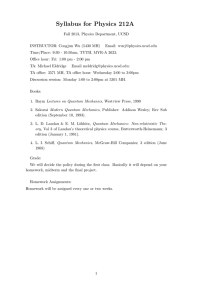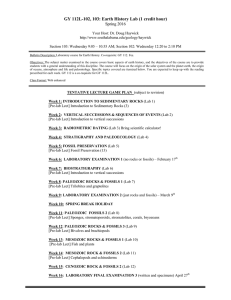Fall 2009 Your Host: Dr. Doug Haywick (
advertisement
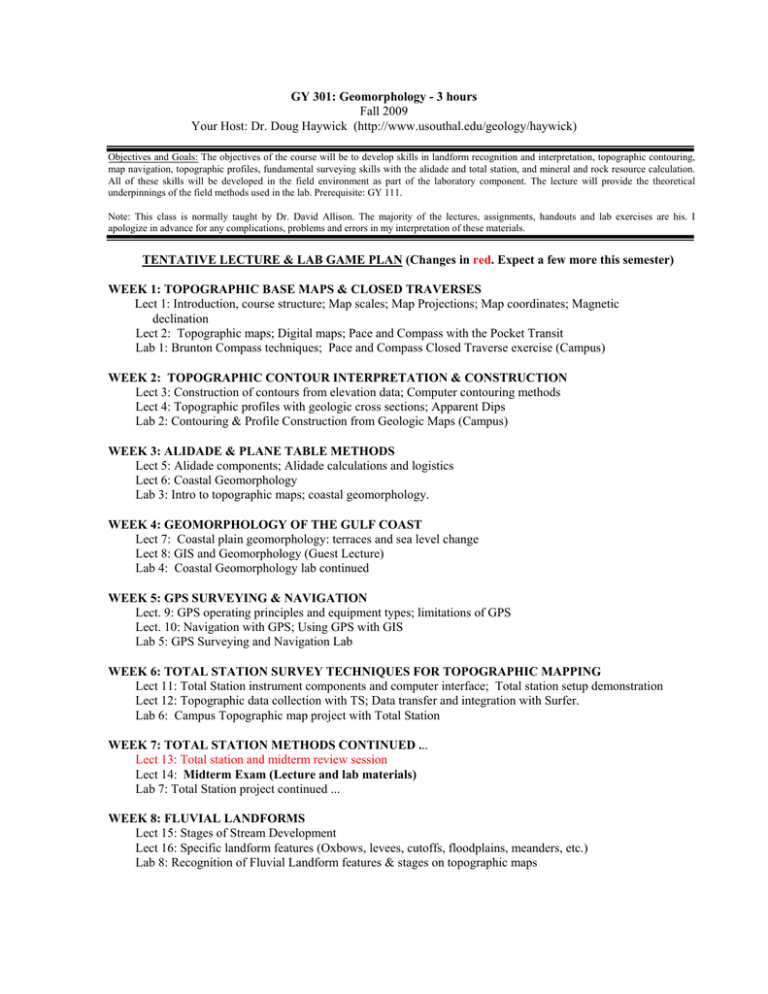
GY 301: Geomorphology - 3 hours Fall 2009 Your Host: Dr. Doug Haywick (http://www.usouthal.edu/geology/haywick) Objectives and Goals: The objectives of the course will be to develop skills in landform recognition and interpretation, topographic contouring, map navigation, topographic profiles, fundamental surveying skills with the alidade and total station, and mineral and rock resource calculation. All of these skills will be developed in the field environment as part of the laboratory component. The lecture will provide the theoretical underpinnings of the field methods used in the lab. Prerequisite: GY 111. Note: This class is normally taught by Dr. David Allison. The majority of the lectures, assignments, handouts and lab exercises are his. I apologize in advance for any complications, problems and errors in my interpretation of these materials. TENTATIVE LECTURE & LAB GAME PLAN (Changes in red. Expect a few more this semester) WEEK 1: TOPOGRAPHIC BASE MAPS & CLOSED TRAVERSES Lect 1: Introduction, course structure; Map scales; Map Projections; Map coordinates; Magnetic declination Lect 2: Topographic maps; Digital maps; Pace and Compass with the Pocket Transit Lab 1: Brunton Compass techniques; Pace and Compass Closed Traverse exercise (Campus) WEEK 2: TOPOGRAPHIC CONTOUR INTERPRETATION & CONSTRUCTION Lect 3: Construction of contours from elevation data; Computer contouring methods Lect 4: Topographic profiles with geologic cross sections; Apparent Dips Lab 2: Contouring & Profile Construction from Geologic Maps (Campus) WEEK 3: ALIDADE & PLANE TABLE METHODS Lect 5: Alidade components; Alidade calculations and logistics Lect 6: Coastal Geomorphology Lab 3: Intro to topographic maps; coastal geomorphology. WEEK 4: GEOMORPHOLOGY OF THE GULF COAST Lect 7: Coastal plain geomorphology: terraces and sea level change Lect 8: GIS and Geomorphology (Guest Lecture) Lab 4: Coastal Geomorphology lab continued WEEK 5: GPS SURVEYING & NAVIGATION Lect. 9: GPS operating principles and equipment types; limitations of GPS Lect. 10: Navigation with GPS; Using GPS with GIS Lab 5: GPS Surveying and Navigation Lab WEEK 6: TOTAL STATION SURVEY TECHNIQUES FOR TOPOGRAPHIC MAPPING Lect 11: Total Station instrument components and computer interface; Total station setup demonstration Lect 12: Topographic data collection with TS; Data transfer and integration with Surfer. Lab 6: Campus Topographic map project with Total Station WEEK 7: TOTAL STATION METHODS CONTINUED ... Lect 13: Total station and midterm review session Lect 14: Midterm Exam (Lecture and lab materials) Lab 7: Total Station project continued ... WEEK 8: FLUVIAL LANDFORMS Lect 15: Stages of Stream Development Lect 16: Specific landform features (Oxbows, levees, cutoffs, floodplains, meanders, etc.) Lab 8: Recognition of Fluvial Landform features & stages on topographic maps WEEK 9: ARID LANDFORMS Lect 17: Stages of Arid Landform Development; Landform features; Lect 18: Recognition of structural elements, Influent and effluent streams Lab 9: Alluvial fans, arid landforms and structural features WEEK 10: KARST LANDFORMS Lect 19: Stages of Karstic Landform Development Lect 20: Hydrogeologic gradients; Artesian aquifer systems Lab 10: Recognition of Karstic Landform Features & Stages WEEK 11: ALPINE GLACIAL LANDFORMS Lect 21: Glacial Budgets; Glacial mechanics; Glacial transport systems Lect 22: Alpine Glacial landform features Lab 11: Recognition of Alpine Glaciation Features and Stages WEEK 12: CONTINENTAL GLACIAL LANDFORMS Lect 23: Continental glacial cycles; Causes of continental glaciation Lect 24: Continental glacial landform features Lab 12: Recognition of Continental Glaciation Features and Stages WEEK 13: EOLIAN (WIND) LANDFORMS Lect 25: Desert climate zones; Dune formation; Rain-shadow zones Lect 26: Dune landforms and migration; Loess deposits Lab 13: Recognition of Eolian Landforms WEEK 14: NORTH AMERICAN PHYSIOGRAPHIC PROVINCES Lect 27: Appalachian Landforms and Provinces; Cratonic Landforms Lect 28: Geomorphology of the Canadian Shield Lab 14: Final Lab Exam WEEK 15: TECTONIC INTERACTIONS WITH LANDSCAPES AND CLIMATE Lect 29: Earth's Climate Zones; Rain-shadow effects; Orographic lifting Lect 30: Thanksgiving Holiday Lab 15: Thanksgiving Holiday) WEEK 16: FINAL WORDS Lect 31: Review for final exam FINAL EXAM: 10:30 a.m. - 12:30 p.m Tuesday, December 8 Reasonably useful information: Text book (reference): Grotzinger, J., Jordan, T., Press, F. and Siever, R., 2007, Understanding Earth (5th ed.), W.H. Freeman and Co., New York, ISBN 0-7167-6682-5 Computer Access Policy: Students are required to have access to a computer with certain minimum capabilities such as internet access. Internet access will be used to access assignments and other course materials. This is a university requirement for all students- for more information on this policy please refer to the USA Bulletin. Lab supplies There is no lab manual required, nor are there many lab supplies needed. However, you might as well start looking like real geologists and obtain as many optional items as possible. Give the following list to your momma and papa for Christmas. Recommended Geo Hammer Good hand lens Brunton-style compass Quality handheld GPS Lap top computer Toyota SUV with satellite dish and built-in bar Required Note books Pencils, colored and graphite Rapidograph or artists pens Calculator (scientific) Assessment: Attendance Lab assignments Final lab Test Midterm Test Final Exam Grading: A - 90+ 10% 40% (lab 1; 5%; lab 6: 12.5%; all others: 2.5% each) 10% 20% 20% Total 100% B - 80 to 89 C - 70 to 79 D - 60 to 69 F - 59 and below Laboratories: It is up to you to examine the maps that are assigned in this course and to do all of the laboratory assignments (even those outside regardless of the weather). You may do this during the lab periods and\or outside of normal university hours. A good chunk of your mark in GY 301 will be based upon lab material, so spend time in the lab. Outside of normal lab periods, use room 337 (our assigned lab room is 042). Refer to the web page (when it is up!) for lab assignment due dates. I do not give extensions; labs assignments not turned in on time will not be accepted (you get an F for that assignment). Attendance/Participation: You learn by coming to class, by asking questions and by participating in lab discussion sessions and field trips. I will assess you on how well you do. Expect a class role to be read/circulated at the beginning of every class/lab. Exams: The reason for producing a syllabus is to give students advanced notice of exams and assignment due dates. Translation: there is no excuse for missing an exam. However, sometimes it happens. If you have a legitimate excuse for missing an exam (i.e. medical problem), you will be permitted to write a make-up during the last week of classes provided that you show me a signed certificate from a medical doctor stating that it was impossible for you to make the exam. The make up exam will consist of 2 essay questions with no choice on your part. The fine print: Plagiarism and cheating are not permitted in this class and either of them will result in severe embarrassment to you (and quite possibly an F for the assignment or exam in question) if you are caught doing them. Be sure to use proper reference citations in your take home exam otherwise it’s plagiarism. See me if you need help about this before the exam. Disability disclaimer:In accordance with the American's with Disabilities Act (ADA) students with bona fide disabilities will be afforded any reasonable accommodation. The Office of Special Student Services will certify a disability and advise faculty members of reasonable accommodations. If you have a specific disability that qualifies you for academic accommodations, please proved us with certification from the Office of Special Student Services, directed by Ms. Andrea Agnew, and located in the Student Center, room 270. The phone number is 460-7212. Changes in Course Requirements: Since all classes do not progress at the same rate, instructors may wish to change the number and frequency of exams, or the number and sequence of assignments. Inclement weather (e.g., hurricanes) may also force rescheduling of lectures, assignments or exams. When ever possible, this material will be made up. Students will be given adequate written notice of any changes in lecture sequence, assignment due dates and/or exam date changes. D. Haywick Contact Information and Schedule How & where to find Doug: I reside in LSCB room 049. I believe in open office hours, so feel free to pay me a visit anytime that I am not in class between 9:00 am & 5:00 pm (except on my research days!). However, I will generally be in my office during the times posted on my schedule. Should you be unsuccessful in your attempts to find me, fear not! You have two options: 1) check the Where's Doug note on my door for my location during normal office hours, or 2) leave a message for me: Telephone: 460-7569 (Haywick’s office – you can leave a message). E-mail: dhaywick@jaguar1.usouthal.edu internet: http://www.southalabama.edu/geology/haywick D. Haywick Hours (Fall 2009 Semester) Time Monday Wednesday Friday 8:00-8:50 AM 9:05-955 AM 10:10-11:00 AM 11:15 AM12:05 PM 12:20-1:10 PM Office Office Office Office Office Reserved for GY Students involved in Research GY 301 Lab (LSCB 042) 12:20 to 2:10 PM Office 1:25-2:15 PM GY 402/544 (LSCB 337) 12:20 to 3:20 PM 2:30-3:20 PM 3:35-4:25 PM Office Time 8:00-9:15 AM 9:30-10:20 AM 10:20-10:45 11:00 AM-12:15 PM 12:20 – 1:45 PM 2:00-3:50 PM 4:00 – 5:00 PM Tuesday Thursday GY 301 (LSCB 042) Office (for GY 301 students) GY 301 (LSCB 042) Office (for GY 301 students) GY 302 (LSCB 337) GY 302 Lab (LSCB 337) 1:00 PM to 3:50 PM Office (for GY 302 students) GY 302 (LSCB 337) GY 402/544 (LSCB 337) 12:20 PM to 3:20 PM Office (For GY 302 students) Note: shaded areas are research\committee\personal times: STAY AWAY! Note: Tuesdays and Thursdays will be very intense for Haywick this semester. You are strongly advised to visit during office hours for Monday, Wednesday or Friday. Please turn off all beepers and cellular phones before you enter the classroom. I hate those noisy things and they can really be an embarrassment to you when they go off. (The embarrassment comes primarily from the tennis balls I throw in your direction)
